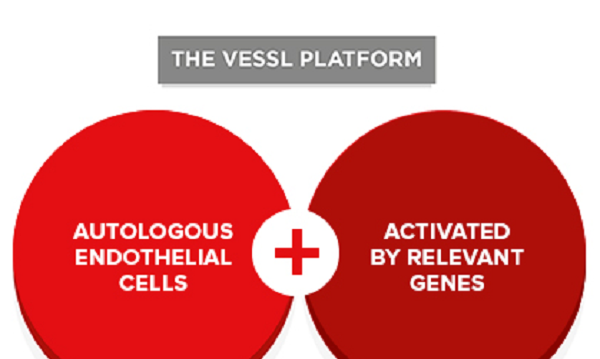VESSL Therapeutics Is a Medtech Startup Offering New Cardiovascular Treatments
The company just raised $16 million.
Israeli medtech startup VESSL Therapeutics develops new treatments for a wide range of blood-vessel-related disorders. The company just completed a $16 million financing round led by China’s RunYoung Capital. The company has also reportedly raised $20 million from Tamir Fishman, Aviv Fund, and the Ofer Brothers XT Fund, Teva Pharmaceutical Industries Ltd. and private investors including Eitan Wertheimer.
Founded in 2000 by CEO Prof. Moshe Flugelman and formerly called MGVS, VESSL Therapeutics develops cell-based therapies for patients who suffer from cardiovascular and other vascular-related conditions and cannot be treated adequately with existing therapeutic modalities. Its core technology is based on an integrative approach for the treatment of cardiovascular disease.
VESSL’s two leading products, MultiGeneAngio and MultiGeneGraft, have been approved by the FDA for clinical studies, and two phase 1/2 clinical trials with MultiGeneAngio have been completed.
MultiGeneAngio is a combination of two cell types and two genes, and MultiGeneGraft is the combination of cells, genes, and a synthetic graft. These two technologies are used in therapies for patients with peripheral artery disease and coronary artery disease, and for patients with renal disease requiring hemodialysis.
The company’s products are based on the patient’s own cells, isolated from a short vein segment taken from the patient’s arm under local anesthesia. The isolated cells are activated by the insertion of specific genes and then reintroduced to the patient. By enhancing the formation of collateral arteries, MGA significantly increases blood flow to the oxygen-starved muscles.
The FDA has granted an Investigational New Drug (IND) authorization for MultiGeneGraft.
MultiGeneAngio (MGA), is designed to offer hope to people with no other options. MGA is expected to dramatically improve a patient’s quality of life, improve healing of ulcers, reduce amputations, minimize hospital stays and procedures and decrease the enormous costs associated with CLI.
To date, the company has completed pre-clinical experiments and two phase I/IIa human trials of MGA in PAD patients at the University of Michigan, the University of Pennsylvania and 7 medical centers in Israel. Thirty-five patients have been treated, with no safety issues and promising early indications of efficacy.
VESSL’s MultiGeneGraft (MGG) is a biosynthetic vascular graft lined with a patient’s own endothelial cells which are modified by specific genes. Lining the graft with these cells provides a clot-resistant vessel that’s expected to outlast and outperform synthetic products currently in use.
By improving compatibility and reducing complications, the company declares that MGG will reduce interventions, hospitalization time and the number of required surgeries. Pre-clinical trials demonstrated successful adhesion of the endothelial cells to the graft material and a reduction in short- and long-term failure rates.
The FDA has granted IND for MGG, and a phase-I study in 10 hemodialysis patients is planned.
Read more about: MedTech, VESSL Therapeutics




